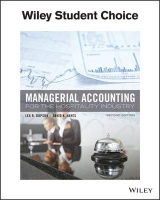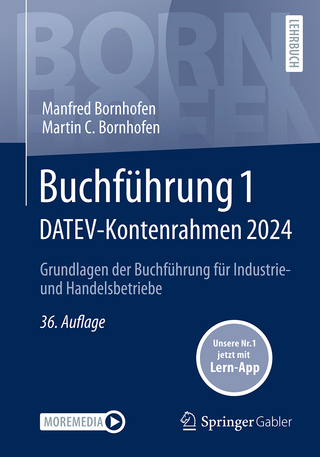
Managerial Accounting for the Hospitality Industry
Wiley-Blackwell (an imprint of John Wiley & Sons Ltd) (Verlag)
978-0-471-72337-0 (ISBN)
- Titel erscheint in neuer Auflage
- Artikel merken
Note: CD–ROM/DVD and other supplementary materials are not included as part of eBook file.
Lea R. Dopson is Chair and Associate Professor of the Hospitality management program at the University of North Texas. Previously, she taught at Cal Poly Pomona, the University of Houston, and Texas Tech University, Lea holds an Ed.D. from University of Houston, and an MBA and BS in Restaurant, Hotel, and Institutional Management from Texas Tech University. her areas of teaching include hospitality managerial accounting, hospitality finance, and food and beverage cost controls. She is published in a variety of journals and has presented her research at numerous conferences. She has also co–authored with David Hayes, Food and Beverage Cost Control, published by John Wiley & Sons, which is presently in its fourth edition. Lea spent nine months in Zimbabwe, Africa, developing a degree program in international hospitality and tourism,. In addition to her academic career, she has held various unit and corporate hospitality management positions with Texas tech Foodservice, Sheraton Hotels, and Bristol Hotels. David K. Hayes earned his Ph.D. in Education from Purdue University, as well as MS and BS degrees in Hotel/Restaurant Management. He held faculty positions at Purdue University and the University of Houston. At Texas Tech University he founded the Restaurant/Hotel program and served as Chair of the Department of Nutrition, Education and Restaurant/Hotel Management. Dr. Hayes was Vice President of the Educational Institute (E.I.) of the American Hotel and Lodging Association and was responsible for the development of training programs utilizing advanced technology delivery systems. An industry practitioner as well as academician, for six years he was the Owner/General Manger of the full–service Clarion Hotel and Conference Center in Lansing, Michigan. An accomplished author, his scholarly articles have appeared in The Cornell Quarterly. He has written 12 books, including texts translated into Spanish, Chinese, Portuguese, and Croatian. he is now a full–time author who divides his professional writing and industry advising activities between offices in Okemos, Michigan and Jamestown, Tennessee.
Preface.
PART I: ACCOUNTING FUNDAMENTALS.
Chapter 1: Hospitality Industry Accounting.
Unique Aspects of the Hospitality Industry.
The Purpose of Accounting in the Hospitality Industry.
Branches of Accounting.
Why Hospitality Managers Use Managerial Accounting.
The Uniform System of Accounts.
Ethics and Hospitality Accounting.
The Blue Lagoon Waterpark Resort: A Case Study.
Can You Do the Math?
Review of Learning Outcomes.
Apply What You Have Learned.
Key Terms and Concepts.
Test Your Skills.
Chapter 2: Accounting Fundamentals Review.
Bookkeeping and Accounting.
The Accounting Formula.
Recording Changes to The Accounting Formula.
Generally Accepted Accounting Principles.
The Hospitality Business Cycle.
Review of Learning Outcomes.
Apply What You Have Learned.
Key Terms and Concepts.
Test Your Skills.
PART II: FINANCIAL STATEMENTS.
Chapter 3: The Income Statement.
The Purpose of the Income Statement.
Income Statement Preparation.
Income Statement Analysis.
Review of Learning Outcomes.
Apply What You Have Learned.
Key Terms and Concepts.
Test Your Skills.
Chapter 4: The Balance Sheet.
The Purpose of the Balance Sheet.
Balance Sheet Formats.
Balance Sheet Content.
Components of the Balance Sheet.
Balance Sheet Analysis.
Review of Learning Outcomes.
Apply What You Have Learned.
Key Terms and Concepts.
Test Your Skills.
Chapter 5: The Statement of Cash Flows.
Understanding Cash Flows.
The Purpose of the Statement of Cash Flows (SCF).
Sources and Uses of Funds.
Creating the Statement of Cash Flows.
Statement of Cash Flows Analysis.
Review of Learning Outcomes.
Apply What You Have Learned.
Key Terms and Concepts.
Test Your Skills.
Chapter 6: Ratio Analysis.
Purpose and Value of Ratios.
Types of Ratios.
Comparative Analysis of Ratios.
Ratio Analysis Limitations.
Review of Learning Outcomes.
Apply What You Have Learned.
Key Terms and Concepts.
Test Your Skills.
PART III: MANAGEMENT OF REVENUE AND EXPENSE.
Chapter 7: Food and Beverage Pricing.
Factors Affecting Menu Pricing.
Assigning Menu Prices.
Menu Price Analysis.
Review of Learning Outcomes.
Apply What You Have Learned.
Key Terms and Concepts.
Test Your Skills.
Chapter 8: Revenue Management for Hotels.
Overview.
Establishing Room Rates.
Revenue Management.
Non–Room Revenue.
Apply What You Have Learned.
Key Terms and Concepts.
Test Your Skills.
Chapter 9: Managerial Accounting for Costs.
The Concept of Cost.
Types of Costs.
Cost/Volume/Profit Analysis.
Review of Learning Outcomes.
Apply What You Have Learned.
Key Terms and Concepts.
Test Your Skills.
PART IV: ACCOUNTING INFORMATION FOR PLANNING.
Chapter 10: Forecasting In the Hospitality Industry.
Overview.
The Importance of Accurate Forecasts.
Forecast Methodology.
Utilizing Trend Lines in Forecasting.
Review of Learning Outcomes.
Apply What You Have Learned.
Key Terms and Concepts.
Test Your Skills.
Chapter 11. Budgeting and Internal Controls.
The Importance of Budgets.
Types of Budgets.
Operations Budget Essentials.
Developing an Operations Budget.
Monitoring an Operations Budget.
Cash Budgeting.
Managing Budgets through Internal Controls.
Apply What You have Learned.
Key terms and Concepts.
Test Your Skills.
Chapter 12. Capital Investment, Leasing, and Taxation.
Capital Budgeting.
Capital Investment.
Financing Alternatives.
Taxation.
Apply What you have Learned.
Key Terms and Concepts
Test Your Skills.
Glossary.
About the Authors.
Index.
| Verlagsort | Chicester |
|---|---|
| Sprache | englisch |
| Maße | 156 x 236 mm |
| Gewicht | 1132 g |
| Themenwelt | Wirtschaft ► Betriebswirtschaft / Management ► Rechnungswesen / Bilanzen |
| ISBN-10 | 0-471-72337-1 / 0471723371 |
| ISBN-13 | 978-0-471-72337-0 / 9780471723370 |
| Zustand | Neuware |
| Haben Sie eine Frage zum Produkt? |
aus dem Bereich



